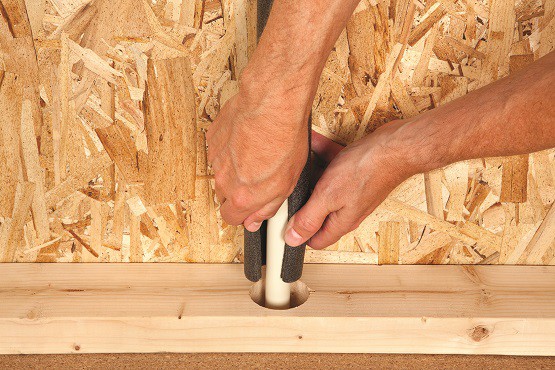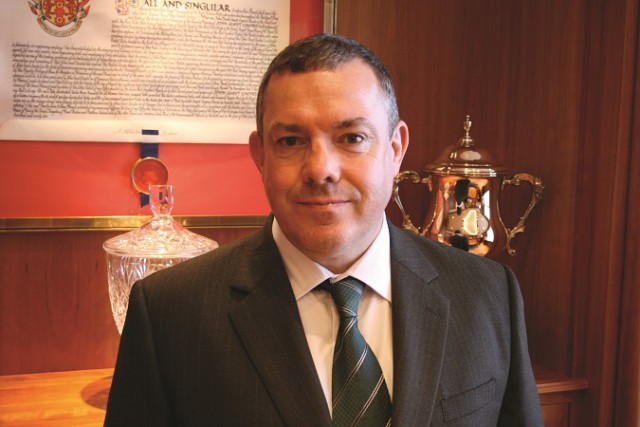The Plumbing and Heating Winter Survival Guide

How the winter season can affect plumbing and heating systems, and what installers can do to prevent these issues.
As we enter the winter season and the shimmering blue skies of summer become a distant memory, installers receive an increasing number of emergency callouts to fix broken plumbing and heating (P&H) systems.
These issues can range from frozen pipework to ineffective heating. Here are three ways plumbing and heating systems can be winterproofed to avoid disruption and comfort for homeowners during the colder months.
Preventing pipes from freezing
According to the Association of British Insurers (ABI), £194 million was paid out to help homeowners deal with burst pipes in the first quarter of 2018, due to bad weather that took its toll on domestic plumbing. Frozen pipes can cause major damage to a property and impact the performance of hot water and central heating systems when they are needed the most.
But plumbing contractors can futureproof these systems for all seasons while carrying out the initial installation by keep these six Ps in mind: preparation, pressure, placement, protection, prevention and programming.
Whether it’s new build or retrofit installations, pipe layouts should be carefully considered. Best practice is to avoid placing pipes in rooms that are prone to getting cold, such as lofts or basements. If pipework does need to be placed in these areas or outside, they should be adequately protected and lagged with insulation. Without lagging, water in the pipes can freeze, creating internal pressure which can cause them to burst.
Alongside this, installers can plan ahead and drain pipes in unoccupied new builds, and also advise homeowners to do the same when bad weather is forecasted. This is particularly important for external taps that are exposed to plummeting temperatures. The process of draining external pipes is simple as you just need to close the internal shutoff valve to stop the mains supply and then drain the exposed pipe. Once the cold weather has passed, you can open the valve to turn the water supply back on. This simple yet effective action takes a few minutes and can save a winter’s worth of worry.
Plumbing and heating installers can also avoid the perils of frozen pipes by keeping them warm at all times. As SSE advise, thermostats should be set at 12-15℃ when the property is unoccupied to prevent internal pipes from freezing. Smart heating controls can help deal with these concerns when the properties are left vacant. They can enable homeowners to manage their thermostats remotely via an app to ensure they are keeping their heating systems safe when even when they are away.
Add anti-freeze when installing underfloor heating (UFH) over winters
Another area that needs winterproof planning is the installation of underfloor heating (UFH). In new builds or renovations, these projects can span over weeks and even months. It’s not uncommon that UFH pipework is installed and screed is laid months before the property is actually ready for use.
If the UFH pipework in the screed is subject to sub-zero conditions while the rest of the project is being completed, the water in the pipes can freeze. This runs the risk of the pipework weakening and splitting as the water expands upon freezing. These concerns aren’t usually detected until much later, when the flooring is already down and the UFH is being used by the homeowners, which can result in costly remedial work.

However, installers can easily avoid this by adding antifreeze to the water in the pipework if it is known that the UFH system could be exposed to freezing temperatures. Once the winter has passed, this water can be flushed out of the system and replaced.
Smart heating controls can help save homeowners from fuel poverty
According to the Department for Business, Energy and Industrial Strategy, in 2018 approximately 2.40 million households lived in fuel poverty and couldn’t afford to keep their homes adequately heated. Additionally, vulnerable groups such as older people, children and people with pre-existing health conditions are more susceptible to cold, which can have a significant impact on physical and mental health.
One solution that installers can recommend to battle fuel poverty is smart heating controls that enable homeowners to heat up specific rooms rather than the whole house. Traditionally most UK homes would have one thermostat to control the heating of the entire house. This results in energy wastage and increased heating bills as not all rooms are used at the same time.
Smart heating controls such as JG Aura can control both UFH and radiators through a single controlling system via its wireless thermostats and TRVs (Thermostatic Radiator Valves).
These can be programmed to deliver desired temperatures in certain rooms, at specific times throughout the day. The heating can be controlled either from a smartphone app or directly through the thermostats and helps cut fuel bills by up to 30%.
However, smart heating controls aren’t commonly used because of perceived cost and disruption. This is where installers can be clever in the way they communicate these options to both the end user and building contractors.
For instance, you wouldn’t have one switch to turn on/off the lighting in your house, so similarly there shouldn’t be one thermostat to turn on/off the heating in the whole house. While there’s an initial up-front cost of installing smart heating controls, the energy savings over the years pay for the technology.
And, when it comes to infrastructure disruption for carrying out the installation, systems such as JG Aura can be fitted wirelessly, limiting the hassle of carrying out re-wiring work.
Beating the winter blues
With careful planning and the use of smart technology, most problems that come with the winter season can be avoided. Alongside that, by adopting best practice and latest technology, installers can ensure they help prevent water and energy wastage to build greener and sustainable homes. This also ensures homeowners have comfortable, warm and safe winters.







